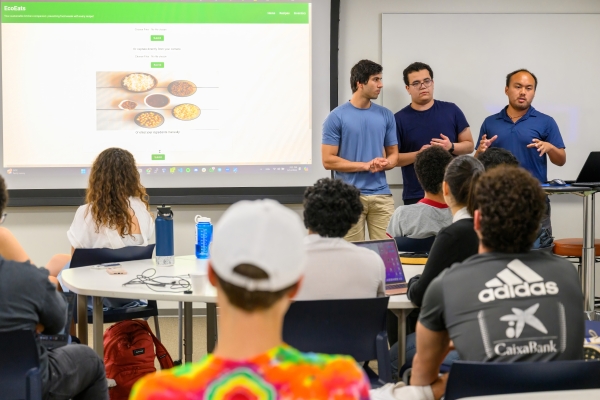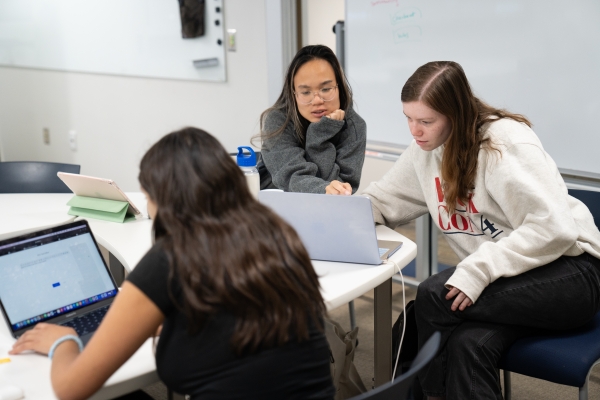W&L Holds Inaugural SOLVE 2024 Hackathon Event on Campus Three winning teams each took home a $1,000 prize for developing products related to sustainability and automation.

The Connolly Center for Entrepreneurship at Washington and Lee University hosted the first annual SOLVE 2024 Hackathon in the IQ Center on Sunday and Monday, May 12-13.
A hackathon is a 24-hour tech event where teams of students can learn new skills while building technology projects that meet a need. SOLVE 2024 was designed to be an interdisciplinary student-centered event open to any W&L undergraduate student. An initial information session on Wednesday, May 8 revealed the event’s focus on sustainability and automation.
Approximately 20 students participated in the inaugural event that began on Sunday, May 12 with students forming groups and breaking out to work on their concepts. Some teams worked through the night, while others completed their work on Sunday and began preparing for Monday’s final presentations.
“It was a wonderful first event, especially for a university that had never hosted a hackathon before,” said Jay Margalus, Johnson Professor of Entrepreneurship and Leadership and director of the Connolly Center for Entrepreneurship. “I’m happy with the amount of student participation, including the students who were there to watch. I heard a lot of whispers in the crowd about their excitement for participating in next year’s event.”
A grand prize of $1,000 was awarded to three separate teams judged to have created the best products or for embodying the spirit of the competition. One winner was selected by a panel of judges that included Margalus; Genelle Gertz, associate dean of strategic initiatives and Thomas H. Broadus Professor of English; William Tolley, visiting assistant professor of computer science; Joel Kuehner, professor of physics and engineering; and alumnus Shane Siebken ’17 from the Capella Space Company. A second prize was determined by voting from the participating teams and a third embodying the spirit of collaboration and helpfulness was selected by a combination of the judges, participants and the student audience.
The judges awarded a $1,000 prize to a student team comprised of Danish Bokhari ’24, Lakpa Sherpa ’25 and Mohamed Soliman ’27, who created EcoEats, a food app designed to revolutionize the way we eat and live sustainably. EcoEats empowers users to make environmentally conscious choices without sacrificing taste or convenience by seamlessly integrating healthy recipies with a focus on reducing food waste. EcoEats utilizes artificial intelligence (AI) to suggest delicious recipes tailored to ingredient availability, smart inventory management and nutritional needs. It encourages users to use ingredients that are closer to their expiration date, significantly reducing food waste.
“The idea for EcoEats was born during a lunch break at a hackathon,” said the EcoEats team. “We noticed a significant amount of unclaimed and uneaten food sitting on the tables, which struck us as a considerable waste. This inspired us to develop a project focused on preventing food waste and promoting sustainability.”

Voting by the participating teams awarded a second $1,000 prize to a team comprised of Ngoc Le ’24, Darya Philips ’24 and Elina Puri ’26. The trio created Fresh Farmers, a versatile platform that connects local farmers with consumers to provide access to fresh, locally sourced produce similar to a Community Supported Agriculture (CSA) program. Farmers enter the type and quantity of their produce, which is listed to consumers as available inventory. Consumers may then purchase on the website with options for shipping or pick-up.
“SOLVE 2024 was an extremely thought-provoking event that emphasized problem-solving within a limited timeframe,” said Puri. “Despite challenges during the app design process, our team worked diligently to create a company that met our vision. This experience was invaluable, and I highly recommend all students participate in the hackathon, regardless of their major. W&L offers many opportunities for students to exercise their creativity and potential, and I encourage everyone to make the most of these opportunities.”
The final $1,000 prize was presented to the team of Mohamed Elhussiny ‘25 and Fekry Mostafa ‘25, who created Green Square, an app that utilizes AI to match people with sustainable clothing by using a virtual “try it on” approach. Users take a photo of themselves and the app utilizes an overlay to show the user what they would look like wearing various sustainable clothing options.
Margalus hopes to grow the program for the years to come, eventually integrating the event with spring term coursework.
“I have early dreams of integrating this into an experience where students work on products and travel to an incubator to receive assistance with their products,” he said. “I think it would be great for faculty to work this into their curriculum and students can receive help along the way. With continued growth, I think it is possible and I am encouraged by what we accomplished in this first year.”
The same enthusiasm was echoed by the students, who learned much from the experience.
“Our favorite part of the SOLVE 2024 experience was undoubtedly the collaborative journey we embarked on as a team,” said the EcoEats team. “Working together towards a common goal and witnessing our collective effort culminate with a final product was rewarding. Throughout the intense 25-hour period or so, we not only developed an app from scratch but also uncovered the power of teamwork. Each member brought unique skills, perspectives, and strengths to the table, fostering an environment where creativity thrived and challenges were overcome. It was fascinating to witness how much we could achieve and how deeply we could learn from one another through consistent collaboration and shared determination.”

You must be logged in to post a comment.